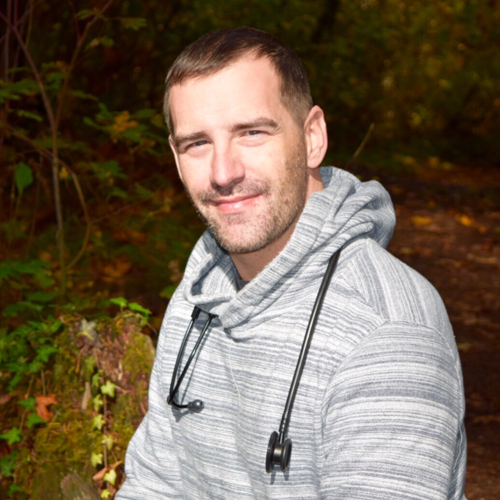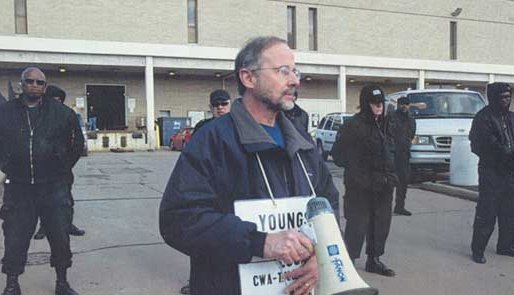The email arrived and initially I only half-heartedly looked at it. It was from a staffing company that wanted security officers to deploy within twenty-four hours, and the details were sketchy.
The author of this is Ken Young. Ken was a friend, coworker, and colleague who killed himself in November of 2017. He was posthumously awarded the Fellowship of the Academy of Wilderness Medicine.

July 10, 1974 – November 19, 2017
I met Ken when he volunteered as a patient for a course I was instructing. Ken had been through the course previously and loved it so much he wanted to come back to support it as a patient. His enthusiasm for remote medicine was seemingly endless. He and I stayed in contact after the course and when he was leaving his position as a Vessel Medical Officer on the Kodiak Enterprise he recommended that I take his place. He and I chatted at length before I took the position and continued to chat while I was on the vessel. We had planned to work together in the future.
I have no idea what was going through his mind in the final moments he was alive, but I don’t believe those thoughts reflect who he truly was. Ken had a lengthy military career that brought him an immense amount of pride and went on to work as a remote medical provider in a variety of capacities. In the weeks before he died he deployed to Puerto Rico to provide aid. As with most suicides his death came as a shock to those around him.
My intention in reposting his writing is to help remember the Ken that I knew. The guy who was deeply passionate about many things including remote medicine.
If you are in crisis call the suicide prevention hotline at 1-800-273-8255. Alternatively, call a friend or call me at 315-484-8087.
If his estate now holds the copyright on these writings and wishes them to be removed I will do so.
A Case for a Medic on a Labor Dispute Security Team
My perceptions, experience, and suggestions for a need based medic provider deployment in support of companies that handle labor disputes.
The email arrived and initially I only half-heartedly looked at it. It was from a staffing company that wanted security officers to deploy within twenty-four hours, and the details were sketchy. I originally had submitted my resume to this company upon my 20yr retirement from Army around a year prior. So long that I can’t remember specifically when, all I knew is it was before I changed my career path from intelligence/security to the field of remote medicine. In the twenty years I spent as a active duty Army Soldier I thought security and intelligence was my field for my post service career. Since my retirement though, I’ve attended nonstop schooling in remote medicine and rescue operations focused eventually being a remote physician, leading to a fellowship in the Wilderness Medicine Academy.
Currently employed in a Emergency Room, as a medic for an industrial job site, and member of two rescue teams, my life settled as I work to earn the patient contact hours required to attend Medical School. Yet, itching to travel again, I noticed a dry spot in my schedule of normal per diem medical positions, so I considered the email. All I had planned for the next week was online lectures for the advanced medic classes I was enrolled in, and meetings for instructors who teach for my business, a CPR and First Aid Training Center, all of which can be done online. So, I called the number on the email and without hesitation flew the next morning.
I’m trained to be a remote industry medic. My skills and certifications go beyond the general EMT scope of practice. As a Wilderness/Remote Medic I practice preventative healthcare, limited primary care, and healthcare coordination in addition to advanced emergency medical skills, and more. Medics in this field are graduates of a community care program or remote medical program focusing on this type of work specifically. Schools that teach this type of care include Remote Medical International (RMI), and Portland Community College (RIAMP & MIH), both I name because I’m proud to be affiliated with them. Paramedics in this field hold the new CP-C specialty, or Community Care Paramedic – Certification. This is a new concept in Paramedicine with recent acknowledgement of the CP-C by the International Board of Specialty Certification (IBSC) and the Board for Critical Care Transport Paramedic Certification (BCCTPC).
Tactical Strike Officers/Evidence Collection Specialists (referred as TSO from here on) arrive on location from all over the country for emergent client needs in their labor dispute reaction. Many TSO’s chase labor disputes with various companies and live a travel/transient lifestyle. Ages of TSO’s I’ve met range from 20 to 69 years old, and include both men and women. Many are retired military and police officers, both professions which are usually indicative of chronic health conditions. These individuals arrive after being exposed to bacteria from airports across the country, with a myriad of simple Rhinitis/Rhinopharyngitis conditions. When I arrived I discovered there was another EMT in the group. Management divided our team up into two shifts, and a medic was placed on each shift. Having medics in the group was an unexpected benefit for the team, not normal practice, but it should be. We were officially signed on as security officers but our medical skills filled a gap both us medical providers and the on-site managers were aware of.
Upon assessment of my own shift of 12 people I discovered I have members with a wide array of past medical histories, although they were fully capable to currently work. Histories include one member with recent pancreatitis, one recovering from his third surgery for {a unspecified to me} cancer, one has a cardiac history with a heart stint installed, three diabetics one of which is grossly obese, and most have secondary hypertension as well. That’s just what I personally witnessed or was informed about within the first five days of the assignment. This is not counting any psycho-social or behavioral conditions they have, and some do have them. Many seem to come from low-medium income households, and some without proper medical insurance, so they forego normal primary care. Upon arriving one individual suffered a bout of respiratory illness that knocked him out of training for two days at the beginning of the response effort, and forced him to seek assistance via a private clinic. I was able to continuously checked on his welfare throughout the project.
Upon my arrival at the worksite, I conducted my own medical credential license check to ensure the scope I can practice in so I can treat my team. Luckily the state in which we worked had reciprocity with all states, and with the National Registry. I then did emergency reconnaissance of the local EMS facilities, providers, and trauma center for the area we were assigned to. The strike response team had to coordinate urinalysis and licensing for security work on location, and this took almost a day to complete. As TSO trainings and briefings happened I watched as some unsafe health practices occurred, for example one individual bought cooked chicken for lunch and left it out and uncovered for several hours before he began to consume it. Perfect equation for a case of E. coli induced sickness. I tactfully intervened as appropriate to keep my team safe in situations like this. I also was the “medical subject matter expert”, often TSO’s who were concerned about a condition (for themself or a loved one) questioned me and I relayed my knowledge, and I verbally referred them to seek assistance from practitioners as needed. If it was for a loved one, it granted them more piece of mind and allowed them to focus on the job more.

Luckily I brought my tactical medical drop-leg trauma bag and some loose medical diagnostic supplies with me. I was able to make up shortages of items I didn’t bring via a quick stop at Walmart out of my own pocket. One thing I had to get was a dental first aid kit, especially after one team member complained of a seven out of ten pain due to pulpitis secondary to a lost filling. I also was able to do blood glucose checks for the diabetics if requested, or if any member showed signs of altered mental status, especially after standing hours outside with sometimes little chance to eat.
With the financial investment the staffing company spent on flying these TSO’s to location (with often less than 24 hours notice), paying for their lodging, and the individuals for their presence at a worksite; I believe it’s in the best financial interests of a company to keep the officers on location instead of having to replace a TSO for a medical condition. Having a medic who’s trained in Remote Care/Wilderness care, or Mobile Intergraded Healthcare would be an asset to regular operations. Specific training in injury mitigation is also warranted because it reduces the potential for reportable medical incidents for insurance and liability purposes, and only refers to clinics patients who really need it. In addition to treating any trauma to the team on the strike-line, the preventative and primary care applications are apparent. As well as the ability to facilitate urinalysis testing; thus reducing costs and coordination time. I believe Mobile Intergraded Healthcare Techs or Remote Medics make a valued asset to the labor dispute response industry and should be strongly considered when mobilizing such teams.
If labor dispute companies want to consider this option, implementation wouldn’t be difficult. Having the hiring authority post jobs for such a medical technician will produce an abundance of qualified individuals. There are always medics ready to deploy at any chance to travel. Many adventure and remote medics utilize social media means in order to locate employment, like AdventureMedics.com. The medics selected should be screened to ensure the completion of either a Remote Medical course, Medical Care Person in Charge course, have the CP-C certification, or be a prior Combat Medic (not just a Military Healthcare Technician) and still hold an active National Registration. They should also have their own medical liability insurance. Ensuring they provide their own medic aid bag would limit company costs, and is a viable option as long as what it must contain is specified prior. Allowing on-site management to purchase replacement medical items to refill as needed, as long as inventory control/usage sheets are properly maintained would be beneficial. Many remote medics position around the world operate in this manner. Pay for medics should be slightly higher than TSO’s. They have a specialized skill-set, and enhanced responsibility. The company should also establish a set of treatment protocols to ensure all medics work on the same page. These protocols should specify limiting treatment and promote private personal care of conditions by team members. This would also limit liability. Even with this slightly enhanced cost to the company it could reduce liability, enhance operations, and look like an asset to potential clients who may hire the dispute response company.

